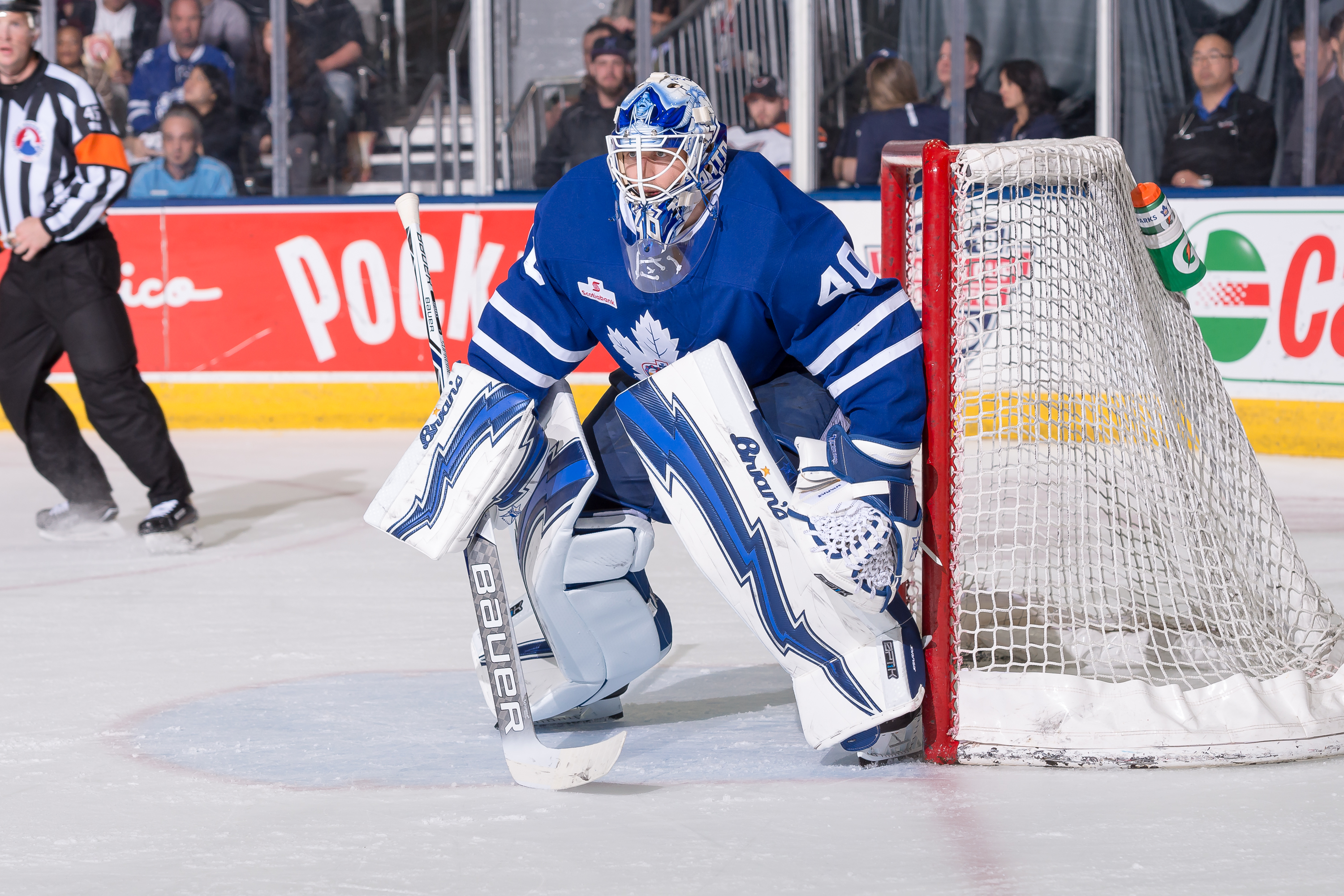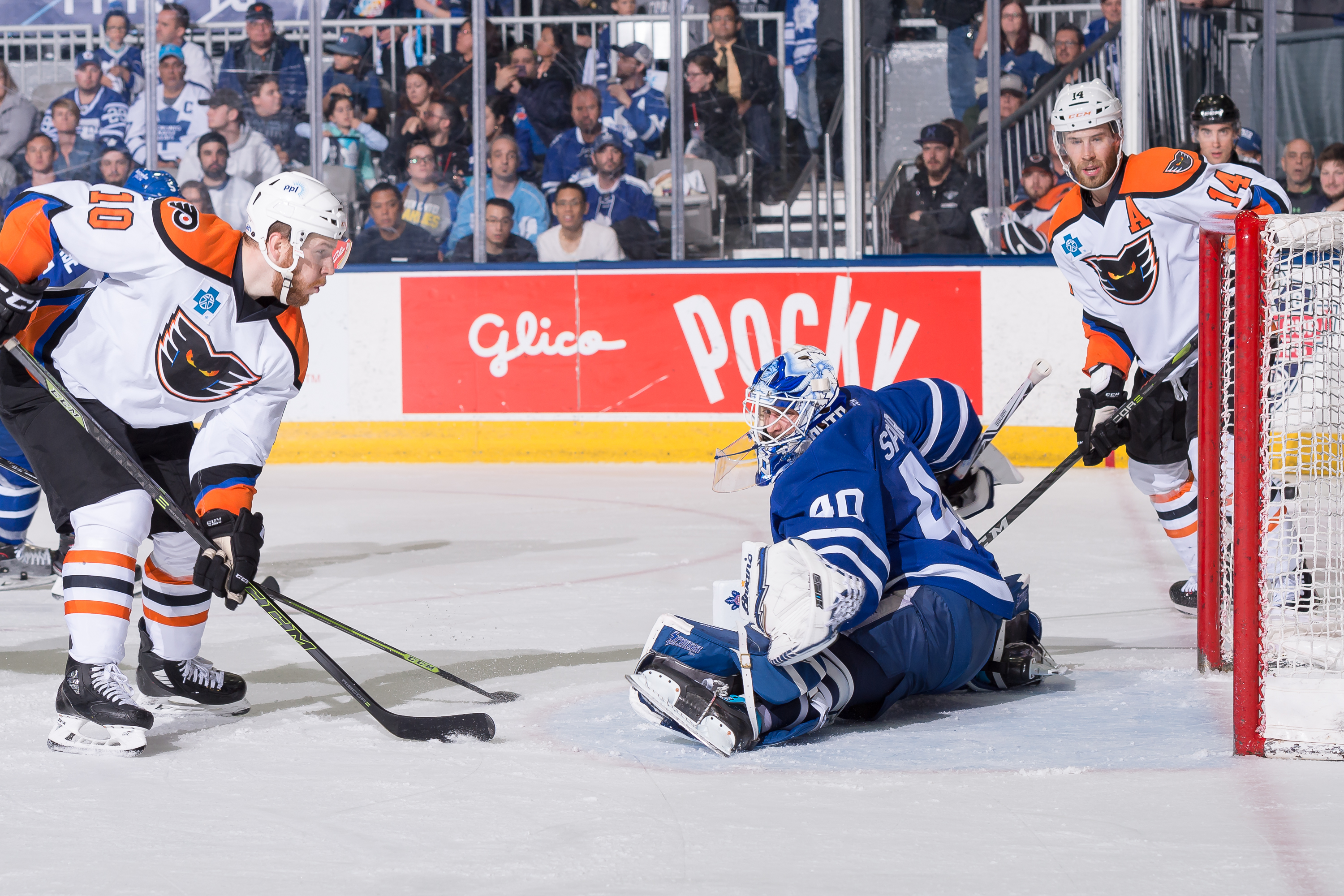Garret Sparks’ mom, Lisa, would sit down on a single step in the family kitchen, a bucket full of tennis balls by her side, and try to chuck them past her seven-year-old boy, who’d frantically block the fuzzy projectiles from hitting a rather wide “net”—a turned-over pool table.
“I don’t know if the love of goaltending came from that, but she definitely helped prepare me for big games when I was younger,” Sparks grins. “You gotta do what you gotta do at that age to get in the zone, and it worked.”
Lisa’s son is now 24, on top of his game and his league.
Sparks backstopped the Toronto Marlies in back-to-back home victories, one in OT, over the weekend to seize a 2-0 series lead over the Lehigh Valley Phantoms in the AHL’s Eastern Conference final.
The seventh-rounder (2011) is now 8-2 with a .921 save percentage in a charmed post-season that is serving as an encore for his pristine regular-season campaign.
Sparks’ 31-9-1 record, six shutouts, 1.79 goals-against average and .936 save percentage easily earned him the Aldege “Baz” Bastien Memorial Award for the AHL’s outstanding goaltender. He and accomplished partner Calvin Pickard, acquired via an eyebrow-raising trade from Vegas, also captured the Harry “Happ” Holmes Memorial Award, the farm circuit’s equivalent of the William Jennings.
“It’s really been a nice partnership,” says head coach Sheldon Keefe. “Just the way [Pickard] is as a teammate and just the energy that he has around the rink and the success that he’s had as a goaltender has really helped Sparks find another level in his game and push him to be at his best every day.”

The mystery is where Sparks goes from here.
The Elmhurst, Illinois, native has one year ($675,000) remaining on his Leafs contract. Sparks memorably shut out the Oilers in his NHL debut, but that was way back on Nov. 30, 2015, and he hasn’t seen a second of ice time with the big club in his past two seasons.
Current Leafs backup Curtis McElhinney, a known commodity who delivered reliable, infrequent starts in 2017-18, also has another year left on his paperwork.
A management overhaul is underfoot, and Sparks needs no more grooming.
Is he ready for a permanent NHL promotion in 2018-19?
“That’s not for me to decide, but from what I’ve seen, yeah, of course,” says Marlies captain Ben Smith. “He’s been here five years now. A lot of goalies have to put their time in the minors. He’s definitely earned a look, and it’s up to him to take advantage of that look whenever he gets it.”
We stood outside the Marlies dressing room to chat with Sparks about his NHL ambition, his beautiful new mask design, and the beats that now serve the function of Mom’s whipped tennis balls — getting him in the zone for big games.
SPORTSNET.CA: Your new mask is special. What compelled you to give that ode to Parker Tobin?
GARRET SPARKS: All of hockey has put [Humboldt Broncos] stickers on the backs of their helmets. I just thought it would be nice to do something a little more permanent, a little more personal. I don’t know Parker Tobin; I never met him. But from all accounts after the tragedy, just hearing everything about him, that was a kid that did things the right way. He loved his teammates, and his teammates loved him. Everybody who was part of his journey loved him. I never played in the junior league out there, but to dedicating yourself to chasing your hockey dreams and spending 15 hours on a bus, I have a lot of respect for somebody like that. Especially when their passion was ultimately the tragic undoing of their life. I sat on a bus that night, and I couldn’t think of a worse fate.
https://www.instagram.com/p/Bi0eJxzgFn9/
The Marlies were on a bus at that exact time?
We were on a bus, too. I can’t remember where we were going. Utica, Syracuse, somewhere in Central New York. It wasn’t nice out. It wasn’t good conditions. We have some of the best bus drivers in the league. I just felt like I’ve been a big part of the goalie community for a long time, and I know Parker was, too, in his own right. I wanted to honour that.
How do you describe the goalie fraternity? It feels like there’s an unspoken bond.
It’s a little different for me. My past is deeply rooted in the social media goaltending community. I was an original member of one of the biggest groups of goaltending brethren on the Internet, so people look up to you as someone who’s made it all the way through and you started as a kid. Now I’m at the level everybody dreams of, so I feel a personal responsibility to represent the goalie community in a certain light, and I thought there was no better way than putting a tribute to him on the back of my mask.
How did you feel when Calvin Pickard first arrived in Toronto?
Threatened. I was threatened. I felt 100 per cent threatened — and I only say that because he’s an incredible goalie. He’d just come off 50 games in the NHL and an amazing World Championship. He’s a good goalie, I’d played against him for years, and I was scared. But it was the best thing that’s ever happened for me.
Really? How come?
Because I got a guy who came in here and he was everything that I needed to learn to be. He’s helped me a lot.
In what way?
Just the way he handles himself around the rink. I was a kid, 19, when I came in here. I really enjoyed what I did. For years I got my wrist slapped along the way. After so much of that, it really closes you up and hardens you, to the point where maybe you don’t enjoy or appreciate things as much anymore. I saw a guy come in here who loved what he did every day. It helped me mentally become a more free goalie. It allowed me to enjoy what I’m doing, enjoy my teammates, enjoy being with this organization for a fifth year.
That wrist-slap the team gave you in 2016, how did it affect you?
This is going back to beyond being drafted. This is eight years in the process. I was making questionable decisions as a young kid, and I don’t blame them for the way they handled me. At a certain point, you just learn to stop. Stop doing things that get you in trouble. So, you stop doing anything at all. [Pickard’s influence] just showed me that you can enjoy it and be great at the same time.
Is this the best hockey you’ve played in your life?
For sure. And it’s due to him. It’s due to the support of having him on a daily basis, getting to work with him every morning, watching how he works on the ice. He’s just a great motivator.
How bad do you want to be in the NHL next year?
I expect to be in the NHL next year. There’s no reason why I shouldn’t be. And if I’m not… I don’t know.
Kyle Dubas is very familiar with your work. The fact he’s GM now, does that increase your chances?
I think my chances are what they are because of what I’ve done this season. I think my relationship with Kyle Dubas is closer than I’ve ever had with any other member of management in this organization. I think he’s somebody who gets me, gets what I’m about, gets the passion I have for what I do. But, ultimately, it’s his decision.
Describe your relationship with Sheldon Keefe.
It’s good. We’ve grown it for three years. At the beginning we were both learning each other, but as time has gone on and we’ve spent more time with each other, I rely on him when I need something from him, and he relies on me when he needs something from me. We have a common passion for winning and advancing this team. That’s what we bond over.
Do you think he’ll be an NHL coach one day?
Yeah. It’s inevitable.
You also run the music for the team, correct?
I’ve done warm-up mixes for on-ice since I was in Guelph in junior, just as a little hobby. Coming here and being able to do them gets a little more exposure, but it’s just a fun process for me. That’s how I spend a lot of my time on the bus—in a Virtual DJ program putting together primitive mixes of songs I like. Ultimately, I’d really like to learn how to produce music. I really have an interest and appreciation for modern music that I feel goes deeper than most people’s. It’s something I want to explore; I’ve just been so focused on hockey and this team this year that I’ve put it on the backburner. I haven’t lost my desire for it.
Virtual DJ is the name of the program you use?
It’s literally the most primitive program you could imagine. You have one finger to control everything. I need a new computer, I need new programs, I need to learn everything. I think learning something like that could be therapeutic for somebody who has a lot of free time on their hands. It’s something I’m looking to get into, but right now I’m focused on [hockey].
Who would be some of the top producers you admire?
Mainstream, I love Flume. A guy like Diplo, who’s been able to create an empire out of dance music, is incredible. Mr. Carmack is an artist who I find to be one of the greatest on Earth. He’s relatively unknown outside of bass music circles at this point, but within them he’s revered as a god. I was able to see him in Toronto this year. Ekali, a young producer and DJ from Vancouver who was in Toronto earlier this year, I was able to see him as well. The connections between music and hockey, I’ve been able to go to a lot of shows I may not have had access to if I wasn’t a professional hockey player. It inspires you. It gives you a different avenue. It means you’re not solely a one-dimensional hockey player. I like to round myself. As you grow out of hockey, you can grow elsewhere in life.

So, do you still program the dressing room music?
I don’t anymore. I did my first year when I was a backup. I control my own music. I got the Beats Studios. I find a lot of my personal power in the music I listen to before games. There’s two producers from Chicago, Louis the Child, they’re pretty much taking over the world as teenagers. They’re early-20s now. They’re from 25 minutes from me in Chicago. They’re touring the world now and releasing incredible music. One of their mixes, Candy, is something I listen to before every game this year. When you have that familiarity with music and your metal space and what you’re doing, that whole continuity puts you in a certain mental spot before you play.
Do you meditate or do any visualization pre-game?
I’ve seen some crazy things. I just make sure I feel good, and I do some racquetball stuff —throwing a ball off the wall to yourself to get your eyes going — but other than that, it’s just getting in front of pucks.
If you expect to make the NHL next fall, what does this summer look like?
Training hard. I don’t see myself taking any time off this summer. I’m going to hit the ground running right when this is over. Hopefully with a win, but no matter what.
[relatedlinks]








